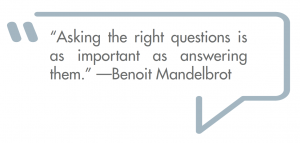Questions are a critical foundation of all relationships that we experience in life. They are said to create learning or liking, and, in the end, they accomplish both.
At a young age, we are groomed to either embrace question-asking or have it shut down. I think of my younger sister at three years old; we referred to it as the “why” age. At 13 years old, I probably gave inappropriate responses to my curious sister or begged her to stop asking by repeatedly answering, “because.” I am now experiencing the “why” age with my own daughter, and we have learned to ask Google when we do not know, because I no longer pretend to know everything, and she has a knack for remembering everything.
If we are shut down at a young age, sometimes that phenomenon carries over into our adult lives (not counting the teenage years, when the majority purport to know it all!). I remember being scared to ask questions early in my career because I thought my leadership team believed that I should have all the answers; isn’t that why they hired me?
When we discuss how best to build professional relationships in sales or guest services, I spend a good deal of time talking about the importance of asking two open-ended questions. Asking open-ended questions makes for the exchange of more information more efficiently than moving through a long list of yes-or-no and other types of questions that aren’t open-ended.
Pro Tip: A great exercise to conduct with teams is called “Sell Me This Pen.” It really helps teams appreciate the power of open-ended questions.
Some of my favorite open-ended questions for sales and guest services include:
What brings you to the area?
What is most important to you?
What did you previously enjoy most?
What would help you most during this time?
How do you feel about the price?
Can you share more details about what exactly happened?
How would you envision this being resolved?
The key is to build on the first question and then ask another open-ended question.
A few years ago, I was working with and getting to know a physical therapist who was new to me. I asked if he had kids. He shared that he had two boys, both 13 years old. It would have been easy for me to assume that they were twins. But I went in for the second question and asked, “How is that?” He opened up and shared with me the most amazing adoption story, including the fact that he adopted his boys in the same city where my adopted daughter’s birth mother is from. I felt an instant connection to him, and it allowed for deep conversations about open adoption and the vulnerability it requires.
I will always go for the second question and steer away from making assumptions. It would have been easy for me to assume he had twin boys, in which case I would have missed out on a story that felt validating and brought me to tears.
Another time, I had been researching material about “asking questions” and came across a good amount of information asserting that people like you better if you ask questions. I decided to put that notion into play at an industry conference. Instead of focusing on making connections based on similarities, I asked questions and in just 10 minutes learned so much about the person with whom I spoke. At the end, this person knew my name and had my business card yet didn’t know much else. As we parted, I received a hug from this person who just minutes before was a complete stranger. I had a huge smile on my face as I thought, “Wow!”
The articles I had read were absolutely correct! People do like you better if you ask questions. People enjoy talking about themselves. All we need to do is ask.
Another approach I use: When I start to feel like I am being critical of someone, I instead channel my energy into curiosity. Maybe the person has made a statement that I find offensive or misaligned with my values, but if I cut short my inclination to judge the person and instead ask the person for more information, I can better understand the context for such a statement and, ultimately, better understand the person. This technique promotes more generous thoughts about others and leads to more compassion for people who feel differently than ourselves.
Asking questions is the key to the difference between coaching and training. What I believe sets my coaching apart is that I am not afraid to ask, “why is that?”
I remember meeting someone who had been a leadership coach for over more than 40 years. She was very passionate about not going to the “why.” However, I believe that when we understand why we behave as we do, it sparks our mindset and enables us to change our patterns of behavior and perception and perhaps understand their deep roots.
I had a one-on-one coaching session with an employee who was struggling with an interpersonal relationship in the organization. She had many judgments about this person and shared with me that she felt anxious when going to work and knowing that she was going to be working with the person. I felt sad for this employee because she was so triggered by this peer. I asked her what she did not like about the person. She ran through a huge list of criticisms, and then I asked if she had ever had someone else in her life who was similar. It took a bit of time for her to recall, and then she exclaimed, “Oh my!” It turned out that this peer reminded her of her foster mother, for whom she had unresolved feelings. When we have such experiences, it is a reminder that we have work to do in this area. Unless and until we dig in and do the personal work, we will continue to experience such situations.
Now, when it comes to coaching others, a few favorite questions I use include:
What do you want to make sure we cover today?
What do you mean by that?
Why is that?
Can you tell me more about that?
What do you believe is creating this behavior?
What is getting in your way?
What is your vision, and how are you going to get there?
What is one thing you took away from our time together today?
There are several different beliefs about why people do not ask questions, such as being egocentric, which is wanting to impress others with their own ideas. For some it is apathy, not even caring enough to ask, or they believe that the answers will bore them. And sometimes it is because they believe that they already know the answers. On the other hand, some people do not ask questions because they feel it will reflect badly on them because the very fact that they’re asking shows that they don’t know the answers.
 Once you have mastered the asking of questions and understand your obstacles, it is important to make sure you are actively listening. I will always remember a conversation I once had with someone who had been a salesperson for their entire career. This person asked me a question and then scanned the room looking over my head the entire time I was answering. If you are going to ask questions, it is critical to listen to what is being said and really demonstrate your interest.
Once you have mastered the asking of questions and understand your obstacles, it is important to make sure you are actively listening. I will always remember a conversation I once had with someone who had been a salesperson for their entire career. This person asked me a question and then scanned the room looking over my head the entire time I was answering. If you are going to ask questions, it is critical to listen to what is being said and really demonstrate your interest.
As Dale Carnegie advocated in his book How to Win Friends and Influence People, make sure that the questions you ask are the questions that others enjoy answering. When asking questions, try not to guess or assume what the answer might be and what you will say next; such anticipation gets in the way of true listening.
I encourage you to go beyond the superficial and get curious by asking questions to learn more and create connections in our world, which has suffered so much from disconnection over the past year.


